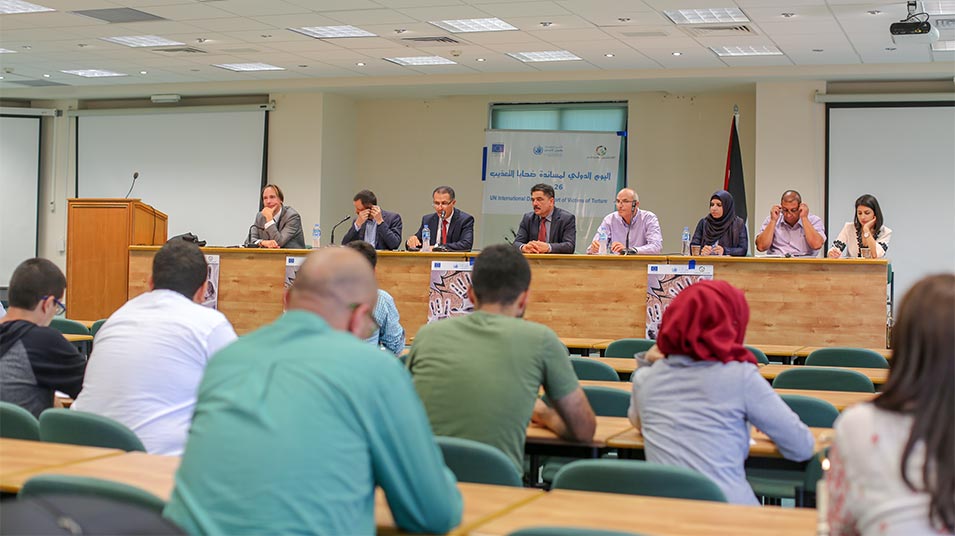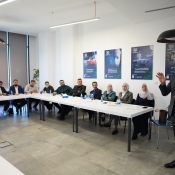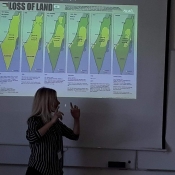In support of torture victims, university organizes symposium on realities, effects of torture
“As legal scholars and practitioners, we at the Faculty of Law and Public Administration have a responsibility to highlight acts of state-sanctioned torture and draw the attention of decisionmakers to such acts,” emphasized Dr. Mustafa Abdul Baqi, chair of the Department of Law at Birzeit University, at a symposium in honor of the International Day in Support of Victims of Torture held on June 26, 2018, on the university’s campus.
The symposium, organized by the Office of the United Nations High Commissioner for Human Rights in the occupied Palestinian territory, the Muwatin Institute for Democracy and Human Rights, and the Palestinian Coalition Against Torture, drew together Palestinian and international legal experts and human rights activists who explored the realities of torture from humanitarian and legal perspectives.
Abdul Baqi, who chaired the sessions of the seminar, defined torture as an activity by a public official that inflicts physical or psychological pain on a person to gain a specific goal. “Torture is most dangerous when carried out by a state-actor in defense of certain morals or rights,” he said. “While it has been phased-out in a majority of the world’s countries, torture remains widespread, and underreported, in a large number of countries and areas.”
The European Union’s Deputy Head of Delegation to the West Bank and Gaza Strip Tomas Niklasson noted that promotion of human rights, good governance, and inclusion all lead to the prosperity of civil society.
“In Europe, we have spent decades to enshrine human rights as a cornerstone of our societies,” Niklasson added. “Instilling respect for human rights, democracy, and the rule of law requires immense effort from all the relevant state and civil society institutions.”
Niklasson reaffirmed the European Union’s commitment to establish anti-torture measures and include all segments of the society in the development process, especially Palestinian women.
In his speech, Jochen De Vylder, head of the United Nations High Commissioner for Human Rights in the occupied Palestinian territory’s capacity building team, stressed the significance of local and international regulations in curbing and combating torture.
“By activating municipal and local legislatures and adopting the regulations of the human rights conventions signed by Palestine, we create legal obligations for the state and the occupying power, Israel,” explained Jochen De Vylder.
Mousa Abu Dheim, director of the Independent Commission for Human Right’s West Bank Program, reviewed the realities of torture by state-level actors in Palestine. Per Abu Dhaim, there were three distinct phases with regard to torture complaints received by the commission: from 1994 until 2007; from 2007 until 2014; and from 2014 until 2018.
“In the early stages, torture cases were few and the interrogation techniques utilized were subdued. Interrogation cases jumped in 2007 and after – after the Palestinian political division. One might say that torture in those years was methodological, intended to serve revenge. In 2014, however, the number of torture cases went down,” Abu Dheim alluded.
Rasha Abbas, an attorney in Addameer Prisoner Support and Human Rights Association’s Research and Documentation Unit, discussed legal representation for Palestinian torture victims in Israeli prisons. Addameer, she noted, submits complaints to two Israeli internal investigation units, one which investigates the border police forces and one that monitors the Israeli intelligence units.
Abbas commented that the complaint handling process is complicated and unjust: “While we do send detailed complaints on torture cases in Israeli prisons, the units responsible for handling internal investigations stall the cases, and they are often unfair and biased in their handling of the inquiries. Out of 1000 cases submitted, none were completed due to, ostensibly, lack of evidence.”
Nehaya Abu Rayyan, director of the Treatment and Rehabilitation Center for Victims of Torture’s Southern Governorates Office – Hebron – briefed the attendees on how the center rehabilitates torture victims through a variety of treatments and therapy sessions.
“The most important thing we do at the center is that we provide torture survivors with a sense of security. We remind them that they’re safe here. We offer them individual counseling and psychological therapy sessions, in addition to group counseling and therapy for the survivors and their families,” Abu Rayyan explained, adding that there are direct victims of torture – the victims themselves – and indirect victims: the victims’ families.
Hilmi Al-Araj, head of the Center for Defense of Liberties and Civil Rights, “Hurryyat,” analyzed how Palestinian laws and regulations address torture in the Palestinian Basic Law, the 1960 Jordanian Penal Code, and the 1936 British Mandate Criminal Code.
“Despite the Palestinian Basic Law condemning torture and upholding human dignity, the Jordanian Penal Code No. 16 of 1960 – the de facto law used in the West Bank and Gaza – categorizes torture as a misdemeanor, not a felony,” stressed Al-Araj.
Ayed Abu Eqtaish, director of the Accountability Program at Defense for Children International – Palestine, detailed the organization’s efforts in protecting children from torture and abuse at Israeli courts and prisons.
“While the Supreme Court of Israeli has banned torture in all of its forms, it is still carried out in Israeli prisons under the watchful eye of the Israeli judicial apparatus. The Israeli court system is used to punish Palestinian children and force them to confess under duress,” said Abu Eqtaish, noting that interrogations of children are usually carried out without a lawyer or a parent present.







